General News
Senegal detains 900 people in security drive
Police in Senegal have detained 900 people as part of a security operation following militant attacks in Burkina Faso and Mali.
The detentions, which were not terror-related, took place over the weekend in the capital Dakar and Thies.
The assaults on a hotel in Mali and a hotel and restaurant in Burkina Faso, both claimed by Islamists, have raised security fears in the region.
Senegal has been comparatively safe but is a popular tourist destination.
Last week the Senegalese government ordered hotels to improve security or face closure.
Senegalese security forces would also step up patrols, the interior minister said.
Eyewitnesses report that presence is already being felt, with police being seen in higher numbers and many vehicles searched.
Those detained over the weekend were not targeted as terror suspects but as part of the wider security alert, officials said.
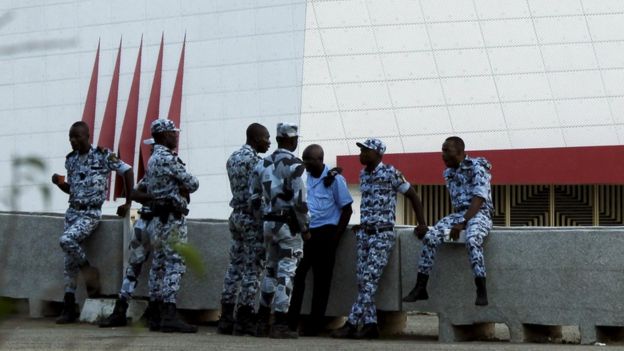
Senegalese hotels have been ordered to boost security, or face closure
Their offences ranged from possessing drugs to having incorrect documents for their vehicles, according to the authorities.
"Security has been reinforced on all levels,'' justice ministry spokesman Soro Diop was quoted as saying by the Associated Press.
Al-Qaeda in the Islamic Maghreb (AQIM) said it was behind the attack in Burkina Faso's capital, Ouagadougou, last month that killed 30 people.
The Islamist militant group also claimed the siege on the Radisson Blu hotel in Mali's capital, Bamako, in November last year, that left 20 people dead.
AQIM is based in the Sahara Desert and roams between Mali, Niger and Algeria.
Senegal has so far avoided a major attack by Islamist militants, despite sharing a border with Mali.
Source: bbc.com
- Read more
-
27/Jan/2016
Oregon protest leader Ammon Bundy seized in deadly clash
US police say they have arrested the leader of an armed militia which has occupied a wildlife refuge in Oregon, with one person killed in a shoot-out.
Ammon Bundy and four others were arrested during a traffic stop. One person was injured. Three others were held in separate incidents.
The militia occupied the refuge this month to support two ranchers jailed for setting fire to federal land.
They say the government has taken land illegally from ranchers for decades.
Other members of the group were reportedly still at the Malheur National Wildlife Refuge in eastern Oregon, where the FBI was setting up a perimeter.
Analysis: James Cook, US West Coast correspondent, BBC News
On Oregon's snowy plains, over the past few weeks, there has been some sympathy for the leaders of the occupation. Many people in the little town of Burns said they understood the militia's message about federal government "interference."
The federal government is not popular with ranchers in Harney County who accuse it of failing to respect a distinct way of life. But there was also hostility to the tactics employed by Ammon Bundy and his followers.
Armed militiamen rumbling in and out of town to gather supplies made residents nervous. So, too, did the presence of the FBI. The community had repeatedly asked the militia to leave but law enforcement officials had come in for criticism, too, accused of passivity in the face of flagrant criminality.
In recent days the pressure had mounted, with Oregon's Governor Kate Brown writing to the White House to demand federal action to end the stand-off. But with both sides heavily armed, violence was always a possibility when, and if, that moment came.
Inside the US refuge seized by militiamen
FBI officials said in a statement that Mr Bundy, 40, was arrested in a traffic stop on Highway 395 along with his brother Ryan Bundy, 43, Bryan Cavalier, 44, Shawna Cox, 59, and Ryan Walen Payne, 32.
Two other activists connected to the group, Joseph Donald O'Shaughnessy, 45, and Peter Santilli, 50, were later arrested, separately, in Burns, Oregon.
Each of the defendants faces a charge of conspiracy to impede police from discharging their official duties through the use of force, intimidation, or threats, the FBI said.
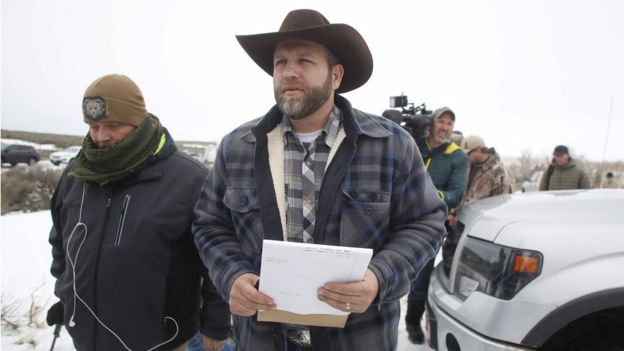
Ammon Bundy (centre) pictured earlier this month at the Malheur National Wildlife Refuge
According to the Oregonian newspaper, Mr Bundy was en route to a community meeting in John Day, Oregon, where he was scheduled to be a guest speaker, when authorities stopped his vehicle.
The newspaper said Ryan Bundy was injured in the arrest, suffering a minor gunshot wound. Authorities did not release the identity of the person killed.
However, local media named the man as Arizona native Robert "LaVoy" Finicum, a regular spokesman for the group.
His daughter, Arianna Finicum Brown, told The Oregonian he was a "good, good man, through and through".
Another occupier of the refuge, Jon Eric Ritzheimer, 32, surrendered to police in Arizona on Tuesday night.
Some 25 miles (40 km) of Highway 395 was shut in both directions following the incident, local officials said.
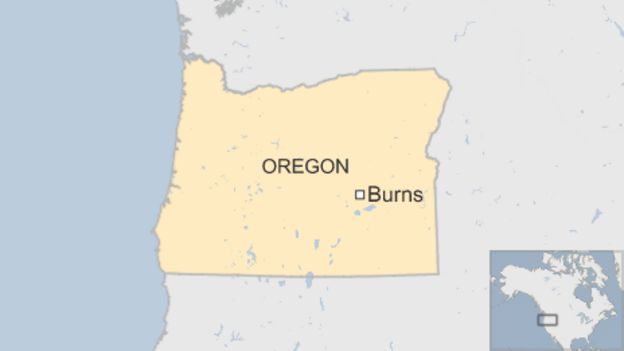
Mr Bundy and a right-wing militia group occupied the refuge on 2 January to protest against the imprisonment of two ranchers in rural Harney County.
Dwight and Steven Hammond had set fires on federal land in 2001 and 2006, they say to clear invasive plants and protect their land from wildfires. A federal judge in October ruled their initial sentences were too short and jailed them for about four years each.
The pair have distanced themselves from the militia movement and although many residents are sympathetic with its cause, many also oppose the occupation of the refuge.
Analysts say security forces took a low-key approach to the Oregon stand-off, fearful of a repetition of the bloody end to the siege at Waco in Texas in 1993.
My Bundy and his brother are sons of rancher Clive Bundy, who was in 2014 involved in a stand-off over grazing rights between armed anti-government activists and federal officials.
The militia includes people from many areas, including, Nevada, Arizona and Michigan.
Source: bbc.com
- Read more
-
27/Jan/2016
South Sudan misses deadline to form unity government
South Sudan has missed a key deadline to create a transitional government, after the president increased the number of provinces from 10 to 28.
The plan for a unity government was part of a peace deal in August to end the civil war which began in 2013 when President Salva Kiir accused his then-deputy Riek Machar of plotting a coup.
The two sides blame each other for violating the terms of the agreement.
Thousands of people have been killed and millions displaced since 2013.
President Kiir, who said he had "reservations" about the August peace deal, appointed 28 new governors for the new provinces, just as rebel delegates arrived in the capital Juba, to begin work on the new government.
Read more
- South Sudan's men of dishonour
- Obstacles to a lasting peace in South Sudan
- Why does South Sudan matter so much to the UN?
The former president of Botswana and head of the Joint Monitoring and Evaluation Commission, Festus Mogae, told Al Jazeera the move was one of the many barriers to peace.
"One important one that has occurred, unfortunate in its timing, is the creation of 28 states because it's inconsistent with what is envisaged in the [peace] agreement and, therefore, it is not acceptable," Mr Mogae said.
The United Nations released a report this week, accusing both President Kiir's forces and Mr Machar's rebels of mutual killings, including "hundreds of extra-judicial killings, enforced disappearances, gang-rapes, sexual slavery, forced abortion, [and] massive child soldier recruitment".
Peter Schumann, former director of the UN Mission in Southern Sudan told All Africa he would have been surprised if the transitional government had been established.
"Both parties have different agendas and do not follow their agreements," Mr Schumann said. "There is no peaceful solution, because both parties are trying to control territory and oil resources."
Source: bbc.com
- Read more
-
24/Jan/2016
US blizzard 2016: New York begins clear-up after mammoth snowfall
A travel ban in New York City has ended as the eastern US begins digging out from the weekend's massive snowstorm.
New York, the most populated city in the US, saw its second-highest snowfall since records began in 1869, Mayor Bill de Blasio said.
As five states saw snowfall of three feet (91cm) or more, the hazards of shovelling snow were brought home by at least six deaths.
A further 12 people have died in other snow-related incidents since Friday.
The storm, dubbed Snowmageddon and Snowzilla on social media, is weakening and heading for the Atlantic Ocean.
It has affected some 85 million people, cutting power to 200,000 people. The heaviest fall was recorded in Glengary, West Virginia, which had 42ins (107 cm).
In Washington DC, the metro is set to remain closed and air travel in the region faces further disruption.
Some 7,000 flights were cancelled this weekend and disruption is to continue into the working week, with at least 615 cancelled for Monday.
In pictures: #snowmageddon2016
How New Yorkers avoided going stir crazy
Why do so many people die shovelling snow?
Why was there so much snow?
Elements often come together to create snow, but not always in the same way and to this extent - it was the perfect winter storm
- A low pressure system was able to transport and circulate huge amounts of moisture north from the Gulf of Mexico
- The position of the jet stream allowed a low pressure system to be picked up and drawn northwards along the eastern seaboard
- Very warm air falling into very cold air from the north and mixing meant there was only one thing that would happen - snow
- Very strong winds: low pressure moves in one direction and high pressure in another and, much like cogs in a wheel, they increased the wind
- The storm moved especially slowly, leading to more snow being dumped over a long time
Many people have taken to streets and parks to enjoy the snow, with a giant snowball fight breaking out on Times Square, New York, overnight.
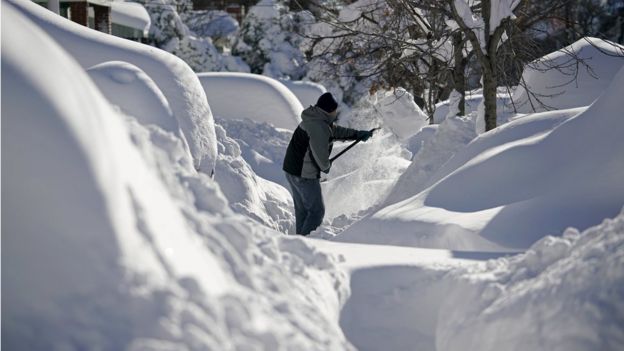
Union City in New Jersey, across the water from Manhattan, saw particularly high snow drifts
By the time the snow had stopped falling after two days, late on Saturday, New York's Central Park had received 26.8in, the second-biggest fall recorded since 1869.
The total was just 0.1in (0.25cm) shy of the all-time high, 26.9in, recorded in February 2006.
However, the 26.6in that fell in the park on Saturday alone was a one-day record for the city.
Governor Andrew Cuomo said the Long Island Rail Road would remain out of action until at least Monday as the line had suffered "significant damage".
"This one is a cautionary tale for all of us," Mr de Blasio said on Sunday. "A storm that a day before, on Friday, was still being projected at eight to 12 inches, ends up being close to 27 inches."
States of emergency were declared in 11 states and in the District of Columbia.
DC director of homeland security Chris Geller warned on Sunday that roads would turn icy overnight, and urged people not to drive.
The capital's mayor, Muriel Bowser, asked residents to help clear snow from the business district.
In Kentucky, Pennsylvania and West Virginia, drivers were stranded for hours on snowbound highways.
At least five people in the New York area died while shovelling or removing snow, the New York Times reports. A sixth death was reported in Baltimore, Maryland.
Among other deaths attributed to the storm was that of a man in North Carolina who stopped to help a motorist whose car had veered off an icy road. Police said the Good Samaritan was shot by the man he had gone to help.
In Ohio, a teenager sledding behind an all-terrain vehicle was hit by a lorry and killed.
Source: bbc.com
- Read more
-
24/Jan/2016
Kenya troops killed by 'huge bomb' in Somalia attack
Explosives three times as powerful as the bomb used in the 1998 US embassy attack in Nairobi were used against Kenyan troops last week, the army says.
A Kenyan contingent of the African Union force in Somalia was attacked by al-Shabab militants in el-Ade, in the south of the country.
Kenya has not said how many soldiers died, but al-Shabab puts the figure at more than 100.
The army has asked people to be patient while it investigates what happened.
In 1998 more than 200 people died when al-Qaeda attacked the US embassy in Kenya's capital, in one of the first operations launched by the jihadist group.
Kenya's Chief of Defence Forces Gen Samson Mwathe told journalists in Nairobi to imagine the damage that "three of those in that small defensive position" can cause.
The BBC's Wanyama Chebusiri in Nairobi says that anxiety and anger has gripped the country in the wake of last week's attack in Somalia and Gen Mwathe may be psychologically preparing the country for news of a large loss of life.
The armed forces chief said that given the size of the explosion, DNA tests may be required for the identification of some of those who died.
But while Kenyans wait for answers, Gen Mwathe said that people should "exercise patience and support out families" as an investigation is carried out.
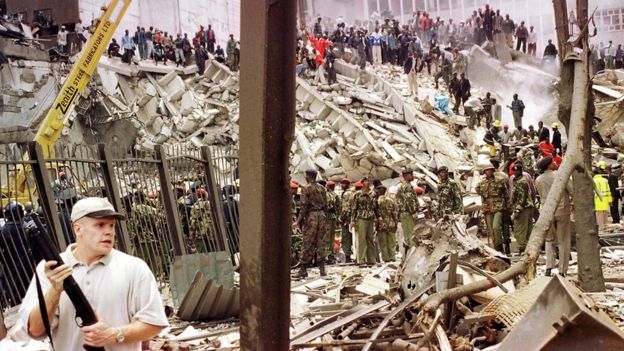
The US embassy was razed to the ground by the attack in 1998
Last week, an al-Shabab official told the BBC that its fighters had attacked the base after morning prayers, starting with a car bomb before storming the facility.
"We took control of the base after one hour of fierce fighting," he said.
Al-Shabab was ousted from the capital, Mogadishu, in August 2011, but still has a presence in large areas of southern Somalia and often stages attacks across the country.
Kenyan sent troops into Somalia to help the government battle al-Shabab in 2011.
Source: bbc.com
- Read more
-
21/Jan/2016
Flint water crisis: Barack Obama says people 'short-changed'
US President Barack Obama has pledged his support to the Michigan city beset by a water contamination crisis, saying Flint had been "short-changed".
Speaking from nearby Detroit, he said: "If I were a parent up there, I would be beside myself that my kid's health could be at risk."
The city's water became contaminated when lead leached from old pipes after a change in supplier in 2014.
Since then, residents have complained of bad smells, headaches and rashes.
Unable to drink tap water, the National Guard has joined volunteers in distributing lead tests, filters and bottled water.
Michigan Governor Rick Snyder has faced calls to resign over the way he has handled the crisis.
On Wednesday he released a batch of emails from 2014 and 2015 concerning the issue.
One email suggests that a day after doctors reported high levels of lead in local children, one of the governor's top advisers told him city officials, not state officials, had to "deal with it".
The switch to a river water source was a money-saving move when the city was under state financial management.
The water from Flint River stripped lead from the pipes and into the supply.
Lead exposure can cause learning disabilities and behavioural problems in children.
Last week, Mr Obama declared a state of emergency in Flint, which is predominantly an African-American, working-class city.
That declaration brought $5m (£3.5m) in federal aid but was far short of the $31m requested by Republican governor Mr Snyder.
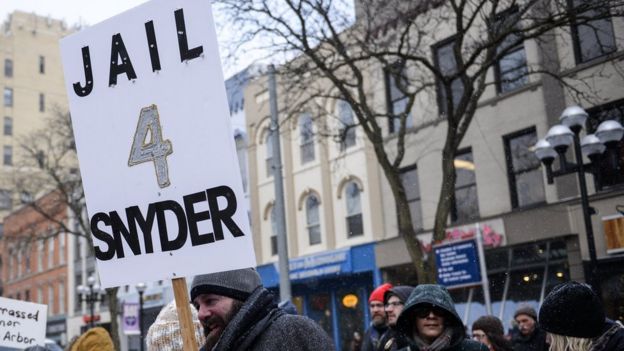
Governor Rick Snyder is blamed by protesters
A day after meeting Flint Mayor Karen Weaver, the president said: "I told her we are going to have her back and all the people of Flint's back as they work their way through this terrible tragedy.
"It is a reminder that we can't short-change the basic services we provide to our people."
Mr Snyder has urged Mr Obama to class the crisis as a federal disaster, saying its severity poses an "imminent and long-term threat" to residents.
By classing it as such, on the same level as natural disasters, the city would be able to get much more federal aid.
In an interview this week, Mr Snyder admitted it was a disaster but denied it was his "Katrina moment" - a reference to the much-criticised response of President George W Bush to the hurricane that devastated New Orleans in 2005.
Source: bbc.com
- Read more
-
21/Jan/2016
'Crippling' snow storm could slam US east coast
Hundreds of thousands of people along the US mid-Atlantic region should be bracing for "perhaps crippling" snow, the National Weather Service has said.
Forecasters say up to 16in (40.6cm) of snow could fall over the weekend in an area that spans big cities such as Washington and Philadelphia.
Blizzard warnings have been issued in some areas, warning of heavy winds and wet snow could lead to power outages.
Earlier storms on Wednesday left drivers in hours-long gridlock.
Crews have cleared roads in the Washington, Virginia and Maryland areas after a small storm left roads icy just ahead of rush hour commutes.
There were reports of otherwise routine short commutes lasting up to three hours, and of some people abandoning their cars.
Washington Mayor Muriel Bowser tweeted an apology to her constituents, saying that officials had "failed to deploy the necessary resources in response to the snow - for that I am sorry".
However, National Weather Service forecasters are warning that Wednesday's storms were just a prelude to a powerful storm that will hit the region on Friday and last until Saturday night.
The details of the coming storm remain uncertain.
When exactly the storm will begin and predictions of the amount of snow that will fall have varied.
"There's a lot of details that are yet to be seen," Rich Otto of the National Weather Service's Storm Prediction Center said. "Subtle changes can make a big difference. We've seen that in storms in the past."
Across the US east coast at a glance:
- grocery store queues are long with residents purchasing milk, laundry detergent and other necessities
- classes were cancelled at schools in Kentucky and Tennessee, the first states being affected by the storm
- major airlines are allowing travellers in affected regions to rebook onto flights ahead of or after the storm.
- Washington, DC Mayor Muriel Bowser has requested Humvees from the National Guard so that emergency responders can reach isolated people and places
- West Virginia Governor Earl Ray Tomblin has activated the National Guard to assist with the storm that could dump 2ft of snow in some parts of the state
- in Philadelphia, Pennsylvania officials are touting large salt stockpiles and plough vehicles in good repair
- in southern New England broadly, predictions are uncertain, but officials are preparing for up to 6in of snow
Source: bbc.com
- Read more
-
21/Jan/2016
Pupils in poor countries lack textbooks, says Unesco
Pupils in the poorest countries are suffering from a lack of basic textbooks, according to a report from a United Nations agency.
The study from Unesco gives examples such as reading books in Cameroon being shared between 12 students.
The report is calling for a more centralised buying system which would make them more affordable.
Report director Aaron Benavot says textbooks are an important way of raising standards in school.
"Next to a good teacher, well-designed textbooks in sufficient quantities are the most effective way to improve students' learning," says Mr Benavot, director of Unesco's Global Education Monitoring Report.
The report suggests the process of distributing textbooks should be approached in the same systematic way as public health programmes.
"We must learn from health and set up a new system so that textbooks can move cheaply and effectively from a printing house to school and into the hands of children," says Mr Benavot.
Unesco says that hundreds of millions of pounds could be saved by a better co-ordinated procurement process.
At present, the different distribution systems around the world, which mean that many pupils have no meaningful access to books, suffer from unreliable funding, a lack of transparency about how money is spent and a failure in predicting demand.
The lack of availability of textbooks from schools means that many families would have to pay for their own copies, which would be unaffordable to the poorest.
Unesco says that in 12 African countries, paying for schools accounts for a third of total household spending.
The report warns that rising numbers of pupils in countries such as Kenya, Malawi and Namibia are making textbooks even scarcer.
There is a warning of a lack of spending on textbooks by governments, with some using less than 1% of education budgets on books.
The Unesco study claims that providing one textbook per pupil in sub-Saharan African countries would increase literacy scores by between 5% and 20%.
The report highlights that the lack of textbooks is not limited to Africa as there are also many pupils without books or having to share them in Paraguay and Argentina.
There have been warnings from the OECD economic think tank that the amount of overseas aid to the poorest countries is falling, as international aid is increasingly being diverted to the Syrian refugee crisis.
Source: bbc.com
- Read more
-
19/Jan/2016
Kenyan Muslim who shielded Christians in al-Shabab attack dies
A Muslim teacher who shielded Christian fellow passengers when their bus was attacked by Islamist militants has died in surgery to treat his bullet wound.
Salah Farah was on a bus travelling through Mandera in Kenya when it was attacked by al-Shabab in December.
The attackers told the Muslims and Christians to split up but he was among Muslim passengers who refused.
A bullet hit Mr Farah and almost a month on, he died in hospital in the capital, Nairobi.
In previous attacks in the area, al-Shabab has killed Christians and spared Muslims.
At the time, Mr Farah told the BBC's Bashkas Jugsodaay that attackers had offered him an escape.
"They told us if you are a Muslim, we are safe. There were some people who were not Muslim. They hid their heads," he said.
However, he recalled to Kenya's The Daily Nation that people were told to separate but they refused.
"We asked them to kill all of us or leave us alone."
Explaining his actions, he told Voice of America earlier this month that "people should live peacefully together".
"We are brothers.
"It's only the religion that is the difference, so I ask my brother Muslims to take care of the Christians so that the Christians also take care of us... and let us help one another and let us live together peacefully".
After his death, Inspector General of Police Joseph Boinnet paid tribute to Mr Farah, telling Kenya's Standard Mr Farah was "a true hero".
Mr Farah's brother Rashid told Kenya's The Star newspaper he hoped his brother's death would bring religious harmony and encourage Kenyans to live as one community.
Source: bbc.com
- Read more
-
19/Jan/2016
Hawking: Humans at risk of lethal 'own goal'
Humanity is at risk from a series of dangers of our own making, according to Prof Stephen Hawking.
Nuclear war, global warming and genetically-engineered viruses are among the scenarios he singles out.
And he says that further progress in science and technology will create "new ways things can go wrong".
Prof Hawking is giving this year's BBC Reith Lectures, which explore research into black holes, and his warning came in answer to audience questions.
He says that assuming humanity eventually establishes colonies on other worlds, it will be able to survive.
"Although the chance of a disaster to planet Earth in a given year may be quite low, it adds up over time, and becomes a near certainty in the next thousand or ten thousand years.
"By that time we should have spread out into space, and to other stars, so a disaster on Earth would not mean the end of the human race.
"However, we will not establish self-sustaining colonies in space for at least the next hundred years, so we have to be very careful in this period."
Reith Lectures: Prof Stephen Hawking
Prof Hawking's first Reith Lecture will be broadcast on 26 January and on 2 February at 9am on BBC Radio 4. BBC World Service listeners can tune in on 26 January at 15:06 GMT and 2 February at 15:06 GMT or catch up online via www.bbc.com/worldserviceradio
BBC News online will be publishing the text of Prof Hawking's lectures with accompanying notes by our science editor, David Shukman.
iWonder: A brief history of Stephen Hawking
It is ironic that such a prominent figure in science identifies scientific progress itself as the major source of new threats.
On previous occasions, he has highlighted the potential risks of artificial intelligence (AI) becoming powerful enough to cause the extinction of the human race.
But he insists that ways will be found to cope.
"We are not going to stop making progress, or reverse it, so we have to recognise the dangers and control them. I'm an optimist, and I believe we can."
Asked for advice for young scientists, Prof Hawking said they should retain a sense of wonder about "our vast and complex" Universe.
"From my own perspective, it has been a glorious time to be alive and doing research in theoretical physics. There is nothing like the Eureka moment of discovering something that no one knew before."
But he also said that future generations of researchers should be aware of how scientific and technological progress is changing the world, and to help the wider public understand it.

Prof Hawking said humans are creating "new ways things can go wrong"
"It's important to ensure that these changes are heading in the right directions. In a democratic society, this means that everyone needs to have a basic understanding of science to make informed decisions about the future.
"So communicate plainly what you are trying to do in science, and who knows, you might even end up understanding it yourself."
Since his diagnosis with motor neurone disease, Prof Hawking's determination to overcome the immense physical challenges of his disability has been a source of worldwide admiration and fascination.
His daughter Lucy, a journalist and writer, who has co-written children's science books with Prof Hawking, was asked to explain his drive.
"I think he's enormously stubborn and has a very enviable wish to keep going and the ability to summon all his reserves, all his energy, all his mental focus and press them all into that goal of keeping going," she said.
"But not just to keep going for the purposes of survival, but to transcend this by producing extraordinary work, writing books, giving lectures, inspiring other people with neurodegenerative and other disabilities, and being a family man, a friend and a colleague to so many people and keeping up with friends across the world."
Source: bbc.com
- Read more
-
19/Jan/2016
Flint, Michigan water contamination: Obama declares emergency
US President Barack Obama has declared a state of emergency in Flint, Michigan, where the water has become contaminated with lead.
The city's water became contaminated after a change in supplier in 2014. Corrosive water leached lead from old pipes into the water supply.
Lead reportedly leached from old pipes into the water supply, after a change in supplier in 2014. and residence say tap water 'made our hair fall out'.
The emergency declaration will unlock $5m (£3.5m) in federal funding.
Earlier in the week, Governor Rick Snyder had requested $31m from the federal government.
He said the need in the city of almost 100,000 people "far exceeds the state's capability" and sought a disaster declaration.
But reports in Michigan said Mr Obama denied that request, that would have freed up more than the $5m, as such declarations are only made for natural disasters.
In October, testing revealed increased lead levels in water supplies and in children's blood. Lead exposure can cause learning disabilities and behavioural problems in children.
Before then, residents had complained of discoloured water, bad smells and headaches and rashes from using the water from the city's new supplier.
The city switched its water source from the city of Detroit to the Flint River in 2014. It has since switched back to Detroit's water.
Michigan's attorney general has said he will investigate the water crisis to see whether any state laws were violated.
The lack of clean water in Flint "is a human tragedy in which families are struggling even with the most basic parts of daily life", said Michigan Attorney General Bill Schuette.
Mr Snyder has already declared an emergency in Flint due to the water situation. Local officials deemed it a public health emergency in October.
He has been criticised for his handling of the water crisis, with protesters calling for him to resign.
As a result of Mr Obama's announcement, officials from the Federal Emergency Management Agency (Fema) will co-ordinate the response in Flint.
On Saturday, the singer Cher said she would donate bottled water to Flint residents, with some 180,000 bottles to be shipped.
"This is a tragedy of staggering proportion and shocking that it's happening in the middle of our country," she said.
Source: bbc.com
- Read more
-
19/Jan/2016
Barack Obama's migrant plan taken up by US Supreme Court
The US Supreme Court has said it will consider a challenge to one of President Barack Obama's key immigration reform plans.
The plan would lift the threat of deportation from five million migrants living illegally in the US.
A coalition of 26 mostly conservative states, led by Texas, has been successful in lower court challenges.
A decision from the highest US court is expected in the early summer, just as the US election gets into full swing.
"We are confident that the policies will be upheld as lawful," said White House spokeswoman Brandi Hoffine.
President Obama announced the plan, known as Deferred Action for Parents of Americans and Lawful Permanent Residents (DAPA), in November 2014.
He justified using his presidential powers, without Congress, by saying it was in response to inaction over the issue of immigration from Congress.
Analysis - Anthony Zurcher, BBC News, Washington
This will only heighten the drama surrounding this issue as the US presidential election season shifts into high gear this summer.
If the White House wins this case, the stakes could not be higher. Hillary Clinton, the likely Democratic nominee, has already pledged to expand upon Mr Obama's unilateral efforts.
Thanks to the efforts of Republican frontrunner Donald Trump to push his party to the right on immigration policy, the Republican nominee - whatever his or her identity - will be nearly certain to reverse course from the first day in office.
If Obama loses the case, the outlook is somewhat murkier. Such a development could boost turnout of a frustrated Hispanic electorate, who largely support the Democrats.
Or it could rally conservatives who view the Supreme Court - whose future composition may be shaped by the next president - as their last bulwark against liberal power.
If allowed to go forward, it would allow people who have lived in the US for more than five years and who have children who are living in the country legally to apply for work authorisation.
In announcing the plan, Mr Obama said it would allow those who qualify to "come out of the shadows and get right with the law".
Challenges to the plan began shortly after Mr Obama's announcement, with a federal court in Texas effectively putting a pause on it in February.
The Obama administration lost an appeal in November, keeping the injunction in place.
The Supreme Court will hear arguments in April and deliver its decision by late June, about a month before the Republican and Democratic parties gather for their nominating conventions.
The White House has vowed to kickstart the programme if the court backs the plan, so migrants could began enrolling before a new president takes office in January 2017.
One of the largest questions looming over the case is whether the state challengers have the right to do so.
Texas argues it will have to spend millions of dollars to provide driver's licences to people who are part of the programme.
The issue of immigration has become a controversial and polarising issue in the 2016 presidential race.
Leading Democrat Hillary Clinton has said she would maintain and expand President Obama's reforms, while her Republican counterpart, Donald Trump has said he would reverse the reforms and step up enforcement.
Source: bbc.com
- Read more
-
19/Jan/2016
Foreigners killed at Burkina Faso luxury hotel
Burkina Faso's government says 26 people were killed and a further 56 injured after Islamist militants attacked a hotel in the capital, Ouagadougou, popular with foreigners.
Al-Qaeda in the Islamic Maghreb (AQIM) has said it carried out the attack, which began on Friday night.
Those killed come from at least 18 different countries, and include two French nationals.
Burkina Faso is to observe 72 hours of national mourning for the victims.
The siege at the Splendid Hotel was declared over after a joint operation by local and French security forces.
At least four attackers died in the assaults. There were claims that some of those involved were women.
As well as the luxury hotel, a cafe and another hotel nearby were targeted. The operation to take back the hotel lasted through the night and into the morning.
Bukinabe President Roch Kabore, who arrived at the scene on Saturday morning amid tight security, said at least 150 hostages had been liberated.
The French government said two of its nationals were killed in the assault, and one is known to be injured. French medical teams were providing support, and forensic officers were travelling to Ouagadougou, it added.
The UK's Foreign Office advised British nationals in Burkina Faso to avoid the area where the attack took place and monitor its travel advice.
In another development, the Burkina Faso government said a foreign doctor and his wife were kidnapped on Friday night in the north of the country, near the border with Mali. There was initial confusion over the pair's nationality - the Burkinabe government said they were Austrian, but later corrected this to Australian.
In November, an AQIM attack on a hotel in Bamako, capital of neighbouring Mali, left 19 people dead.
At the scene: Thomas Fessy, BBC Dakar correspondent
The area surrounding the Splendid Hotel has been cordoned off. Soldiers can still be seen walking in and out of the building but the siege is now over.
At least three cars parked right outside the front door are completely charred, the remains of another two sit just across the street. Two burnt motorbikes lie in the middle.
The light purple colour of the Splendid Hotel's front side now looks black, probably caused by the smoke generated by explosions.
The Yibi hotel, opposite the Splendid, also shows signs of the attack, and the authorities say at least one attacker was killed inside the building.
US hostage describes Burkina terror
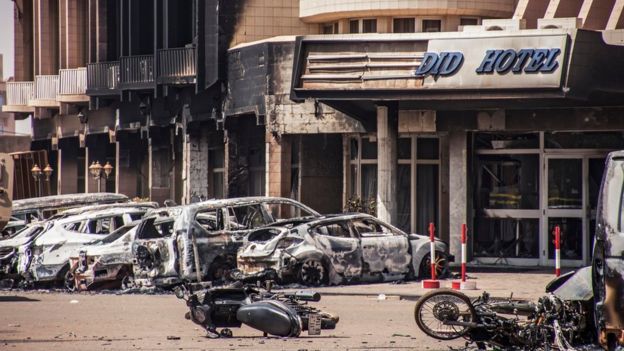
The exterior of the Splendid Hotel was damaged by car bombs
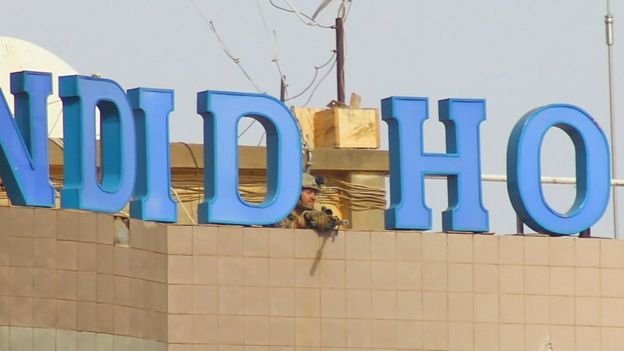
A foreign soldier could be seen on the roof of the hotel
Militants attacked the Splendid and the nearby Cappuccino cafe on Friday evening, setting off several explosions. Both places are popular with UN staff and foreigners.
Survivors described how the militants went from person to person, touching their bodies to see if they moved.
"They started shooting, shooting, and everybody lay down on the ground," said Mariette, who escaped from the hotel with her younger sister.
"As soon as you lifted your head they would shoot straightaway, so you had to pretend to be dead. And they even came to touch our feet to check if we were alive. As soon as you were alive, they would shoot at you."
Background: Tomi Oladipo, BBC Africa security correspondent
Al-Qaeda in the Islamic Maghreb grew from a remnant of a defunct rebel force, rooted in Algeria's civil war in the 1990s, into a wealthy and feared militant group that made its money from kidnapping Westerners and trafficking arms and drugs.
In 2007 it announced it had joined the al-Qaeda network to fight against Western interests. Later though, some of its members left to form their own factions. The most notable of these was Mokhtar Belmokhtar who was behind the 2013 siege of a gas plant in Algeria.
In November 2015 Belmokhtar's faction said it had worked with its parent group to attack a hotel in Mali. That signalled the mending of relations between some of the factions to rebuild the original AQIM, which was being overshadowed by its rival, the so-called Islamic State.
This latest attack in Burkina Faso would seem to be an attempt by AQIM not just to reinforce itself as the main jihadist group in the region, but also to show that it can spread its violent campaign to new frontiers.
Interior Minister Simon Compaore said 10 bodies had been found on the cafe terrace alone.
As the end of the siege at the Splendid was being announced, reports came in that militants had taken up position at the Yibi hotel, a short distance away. One attacker was killed at the Yibi, officials said later.
Remi Dandjinou, the Burkinabe communications minister, told the BBC earlier that between six and seven militants had attacked the Splendid, adding that they had been staying at the hotel as guests.
Mr Compaore said two black Africans and an Arab were among the militants killed.
Burkina Faso recently held its first presidential election since a coup earlier last year.
That coup toppled long-time leader Blaise Compaore, who had governed for 27 years.
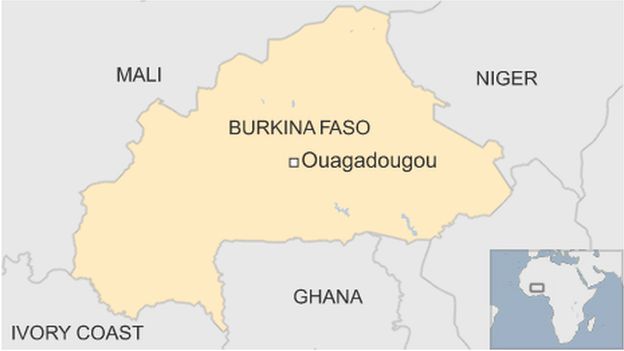
Source: bbc.com
- Read more
-
16/Jan/2016
Jason Rezaian and three other US prisoners freed in Iran
Iran has released Washington Post reporter Jason Rezaian and three other Iranian-American prisoners as it anticipates the lifting of international sanctions.
Rezaian, 39, was convicted of espionage in Iran last year.
The US citizens are being flown to Switzerland and will be taken to a US base in Germany for medical treatment.
The US said it was offering clemency to seven Iranians being held in the United States.
The other three Americans were named as Saeed Abedini, Amir Hekmati and and Nosratollah Khosravi-Roodsari.
A US official said a diplomatic channel was established "with the focus of getting our detained US citizens home".
"Iran has also committed to continue co-operating with the United States to determine the whereabouts of Robert Levinson," the official said.
According to the Associated Press news agency, Mr Levinson is a former FBI agent who disappeared in Iran in 2007 while working for the CIA on an unapproved intelligence mission.
A further 14 Iranians sought by the US would be removed from an Interpol wanted list, the US and Iran said.
The Iranian state news agency listed the seven Iranian citizens being held in the US as Nader Modanlo, Bahram Mechanic, Khosrow Afghani, Arash Ghahreman, Tooraj Faridi, Nima Golestaneh and Ali Saboun.
News of the releases came after Iranian Foreign Minister Javad Zarif predicted that international sanctions against his country would be lifted on Saturday.
He is in Vienna for talks with US Secretary of State John Kerry over Iran's nuclear deal.
The international nuclear watchdog, the IAEA, is expected to confirm that Iran has scaled back its atomic activities in line with the agreement.
Billions of dollars of frozen Iranian assets are expected to be released and the sale of Iranian oil on the world market will again be permitted.
Iran nuclear deal: Key details
Lifting sanctions would unfreeze billions of dollars of assets and allow Iranian oil to be sold internationally.
Jason Rezaian, the Washington Post's Tehran correspondent, had been detained in Iran for more than a year before his sentencing last November. The WP has dismissed the charges as absurd.
The other three freed on Saturday were: Saeed Abedini, 35, a Christian pastor who had been imprisoned since July 2012 for organising churches in people's houses; Amir Hekmati, 32, a former Marine who spent more than four years in prison on spying charges following his arrest in August 2011 during a visit to see his grandmother. The detention of Khosrawi-Roodsari had not been previously released.
Analysis: Sebastian Usher, Middle East Editor, BBC World Service
For months after his arrest in 2014, there was uncertainty over what accusations Jason Rezaian was facing. He was held in the notorious Evin prison before finally being found guilty on charges that his lawyer said included espionage.
His newspaper vigorously denied this. President Barack Obama said he would not rest until he was freed. Now, his release has been announced in what Iran calls a prisoner swap - an indication he might have been used as a bargaining chip.
Coming just before sanctions are due to be lifted on Iran, his release removes a shadow that had lain over relations between Tehran and Washington even as they were thawing with the nuclear deal.
Jason Rezaian - Now a free man
Iran's press anticipates lifting of sanctions
Many newspapers have hailed "good days ahead" for the economy, but the hardline press has lamented nuclear restrictions, with Vatan-e Emruz declaring closing the Arak reactor amounted to a "nuclear burial".
Moderate Iran and reformist Mardom Salari feared Saudi Arabia and US Republicans would try to sabotage the deal, the latter predicting that "powerful hands will try to boobytrap this path".
Meanwhile Conservative Hemayat said the nuclear deal would not "resolve the problem with the village chief" - referring to the US - and hardline Keyhan argued that the deal had not led to a let-up in US "anti-Iranian propaganda".
Source: BBC Monitoring
What is the nuclear deal?
In July 2015, Iran agreed a landmark nuclear deal with six world powers to limit its sensitive nuclear activities for more than a decade in return for the lifting of crippling sanctions. The US is confident the agreement will prevent Iran from obtaining a nuclear weapon. Iran says it has the right to nuclear energy - and stresses that its nuclear programme is for peaceful purposes only.
When is 'implementation day'?
Iran will not see the UN, US and EU sanctions lifted until the global nuclear watchdog, the International Atomic Energy Agency (IAEA), certifies that it has fulfilled its commitments under the deal. The precise date of the so-called "implementation day" has not been determined. But Iran says it has met those commitments earlier than expected.
What does Iran stand to gain?
The sanctions have cost Iran more than more than $160bn (£102bn) in oil revenue since 2012 alone. Once they are lifted, the country will be able to resume selling oil on international markets and using the global financial system for trade. Iran has the fourth largest oil reserves in the world and the energy industry is braced for lower prices. Iran will also be able to access more than $100bn in assets frozen overseas.
Source: bbc.com
- Read more
-
16/Jan/2016
No where cool afterall as Michigan seeks US government aid in water crisis
Michigan is seeking millions in US government aid for the water crisis in Flint, where the water has become contaminated with lead.
Governor Rick Snyder is requesting $31 million (£22 million) from the federal government because the need "far exceeds the state's capability".
The state has applied for a federal disaster declaration, which the Obama administration will consider.
The city's water became contaminated after switching suppliers in 2014.
Corrosive water leached lead from old pipes into the water supply.
Michigan's attorney general has said he will investigate the water crisis whether any state laws were violated.
The lack of clean water in Flint "is a human tragedy in which families are struggling even with the most basic parts of daily life", said Michigan Attorney General Bill Schuette.
The Federal Emergency Management Agency said it will send a recommendation to President Barack Obama as "expeditiously as possible".
Mr Snyder has already declared an emergency in Flint due to the water situation. Local officials deemed it a public health emergency in October.
Residents complained of discoloured water, bad smells and headaches and rashes from using the water from the city's new supplier.
The city switched its water source from the city of Detroit to the Flint River in 2014.
They have since switched back to Detroit's water.
In October, testing revealed increased lead levels in water supplies and in children's blood. Lead exposure can cause learning disabilities and behavioural problems in children.
Mr Snyder has been criticised for how he has handled the water crisis, with protesters calling for him to resign.
Source: bbc.com
- Read more
-
15/Jan/2016
Two US military helicopters collide near Hawaii
Two US Marine helicopters have collided near the Hawaiian island of Oahu, each with six people on board.
The crash occurred during a night-time training mission late on Thursday but it is unclear why.
Coast Guard Chief Petty Officer Sara Mooers said debris was seen in the ocean.
Marine Capt Timothy Irish told the Associated Press news agency that a search and rescue was under way for the two CH-53 transport helicopters.
The aircraft were from the 1st Marine Aircraft Wing from Marine Corps Base Hawaii, he said.
Ms Mooers told Los Angeles radio station KNX-AM the search would be tough because of darkness and a high surf advisory.
Less than a year ago, a Marine Corps MV-22 Osprey crashed during a training exercise, killing two Marines.

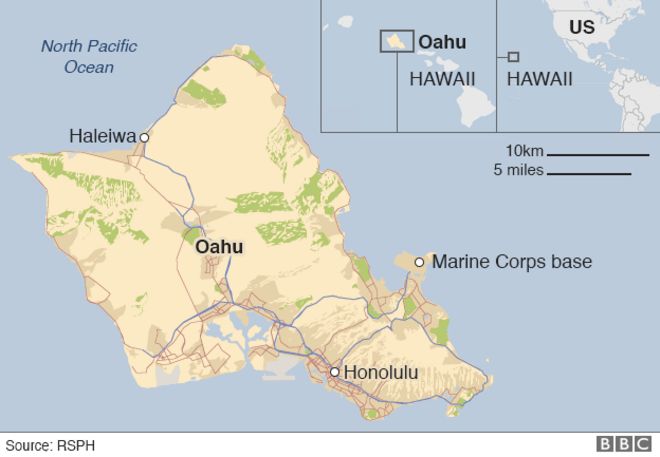
Source: bbc.com
- Read more
-
15/Jan/2016
Egypt steps up raids ahead of revolution anniversary
Egypt's security forces have stepped up raids ahead of the fifth anniversary of the uprising against Hosni Mubarak.
At least five people have been arrested in recent days, including activists accused of running Facebook pages supporting the outlawed Muslim Brotherhood and calling for protests.
The offices of an independent news website were also raided and its managing editor was detained.
Officials have warned against protests marking the 25 January revolution.
Operations have intensified in recent weeks and several other people have been reportedly arrested.
Sites popular with activists have also been shut down to prevent anniversary gatherings.
'Ruin the country'
Two of those detained were identified as a 26-year-old man responsible for 41 Facebook pages and a 22-year-old woman who managed six sites, interior ministry spokesman Abu Bakr Abdel Karim was quoted by Reuters news agency as saying.
Facebook and other social media sites have been used to organise protests and rallies, and several groups have called for demonstrations on the anniversary of the uprising that toppled President Mubarak in 2011.
"The administrators of these pages were arrested on charges of inciting against state institutions and spreading the ideas of the Muslim Brotherhood, as well as calling for marches on the coming 25 January," Mr Abdel Karim said.
"The ministry will continue to stand against these terrorist pages that have long incited violence against state institutions and made fun of the major incidents experienced by the country recently."
Security forces also raided the offices of the independent news website Masr al-Arabiya. Its managing editor Ahmed Abdel Gawad was reportedly released after being arrested on Thursday.
Authorities have expressed concern over protests and Egyptian President Abdul Fattah al-Sisi has warned that another revolution could "ruin the country."
Religious leaders have also warned against protests.
As former armed forces chief, Mr Sisi led the army's overthrow of President Mohammed Morsi, an ex-Muslim Brotherhood official, in 2013 following mass protests.
Since then, more than 1,000 people have been killed and 40,000 are believed to have been jailed in a crackdown on dissent. Most of them have been supporters of the Brotherhood, which was banned in 2013.
But secular and liberal activists have also been prosecuted for breaking a 2013 anti-protest law that gives the interior ministry the power to ban gatherings of more than 10 people.
Last year, the government approved a anti-terrorism legislation which activists said further eroded basic rights and enshrined a permanent state of emergency.
Source: bbc.com
- Read more
-
15/Jan/2016
Kosovo war crimes court to try KLA suspects in The Hague
A special court is being set up in The Hague to try war crimes committed during the 1999-2000 war in Kosovo, the Dutch government says.
It will try serious crimes allegedly committed by members of the Kosovo Liberation Army (KLA) against ethnic minorities and political opponents, a statement said.
The court is set to begin operating later this year.
The conflict pitted ethnic Albanian rebels against Serbian forces.
Until 2008, Kosovo was a province of Serbia. Years of tensions turned into open conflict in 1998, when the Serbian government launched a crackdown.
It eventually withdrew its troops from Kosovo after a two-month campaign of air strikes by Nato in 1999.
Kosovo declared independence from Serbia in 2008, although Serbia has never recognised this.
An estimated 10,000 people died in the conflict and about 1,700 remain missing.
The International Criminal Tribunal for the former Yugoslavia (ICTY) has tried and convicted many Serb officials over the past two decades, but it has generally failed to find justice for hundreds of thousands of ethnic Serbs who were themselves the victims of forced displacements or atrocities.
This has damaged the ICTY's credibility, especially in Serbia, and hampered reconciliation efforts.
Officially, the new tribunal will be a national court of Kosovo, despite its location in The Hague.
But it should finally deal with the long-festering allegations that members of the KLA - many of whom have risen to high positions in the government - committed atrocities.
Members of Kosovo's ethnic Albanian majority who view the KLA as heroes may resent the process. But the tribunal might prove vital, as Serbia and Kosovo continue efforts to normalise relations.
The Dutch statement admits that trying war crimes "is a sensitive issue in Kosovo".
"Possible suspects may be seen by sections of Kosovan society as freedom fighters, and witnesses may feel threatened in Kosovo," hence the reason for cases to be heard abroad.
"It is important for justice to be done," Dutch Foreign Minister Bert Koenders said.
"So we are pleased to be able to offer the court a home."
A 2011 report from the Council of Europe, which monitors human rights, accused KLA rebels of serious crimes, including the trafficking of prisoners' organs.
Parliament in Kosovo approved the creation of the tribunal last year, despite protests and an opposition boycott of the vote.
Kosovan Albanians make up about 90% of the population, and tensions remain with the Serb minority.
Earlier this month anti-government protesters clashed with police in a demonstration against a deal giving more power to ethnic Serbs.
Source: bbc.com
- Read more
-
15/Jan/2016
Al-Shabab seizes African Union base in Somalia
Al-Shabab militants have overrun an African Union military base outside the southern Somali town of el-Ade.
The Islamist group says it has taken "complete control" of the AU camp and killed more than 60 Kenyan soldiers.
Residents told the BBC that al-Shabab had raised its flag at a camp for Kenyan troops and said insurgents had paraded bodies through the town.
But Kenya's army spokesman said it was a nearby Somali base that was stormed and Kenyan troops counter-attacked.
The number of casualties on both sides was not known, Kenyan military spokesman Col David Obonyo said in a statement.
He told the BBC that reports of high Kenyan casualties were "normal propaganda from al-Shabab".
Kenya contributes more than 4,000 troops to the 22,000-strong AU force that is in Somalia helping the UN-backed government battle al-Shabab, which is part of al-Qaeda.
An el-Ade resident told the BBC by phone that he had heard a loud explosion at about 05:30 local time (02:30 GMT), followed by heavy gunfire.
"We then saw an al-Shabab fighter in the town. We also saw Kenyan soldiers who were fleeing from the camp.
"At the moment the camp is in the hands of al-Shabab. We can see military cars burning and dead soldiers all over the place. There are no civilian casualties but most people have fled the town."
Analysis: Tomi Oladipo, BBC Monitoring Africa security correspondent
Al-Shabab is keen to stress - both to the foreign forces in Somalia and would-be defectors within its ranks enamoured by so-called Islamic State - that it is a force to be reckoned with.
It is true that the group exaggerates the scale of its attacks but whether or not the death toll from el-Ade attack is as high as claimed, the African Union mission (Amisom) will have to recognise it still has a long way to go to gain full control of the country.
It says a lot for the insurgents to be daring enough to strike at the heart of an African Union base and engage troops in hours of combat.
They have done this before - in two major attacks targeting the Somali military last year, dozens of Burundian troops and Ugandans soldiers were killed.
Despite these setbacks, Amisom has achieved a lot recently by managing to push al-Shabab out of many parts of southern Somalia.
An al-Shabab official told the BBC that its fighters had attacked the base after morning prayers, starting with a car bomb before storming the facility.
"We took control of the base after one hour of fierce fighting," he said.
"We counted 63 Kenyan bodies inside the base. The other Kenyan troops have run away into the bush and we are hunting them down."
He said the militants were confiscating 28 of 31 military vehicles inside the camp and all arms and ammunition.
The two military bases - one for Somali troops and the other for AU soldiers - neighbour each other on the outskirts of el-Ade, which is in Gedo region, about 380km (240 miles) west of Mogadishu.
Al-Shabab was ousted from the capital, Mogadishu, in August 2011, but still has a presence in large areas of southern Somalia and often stages attacks across the country.
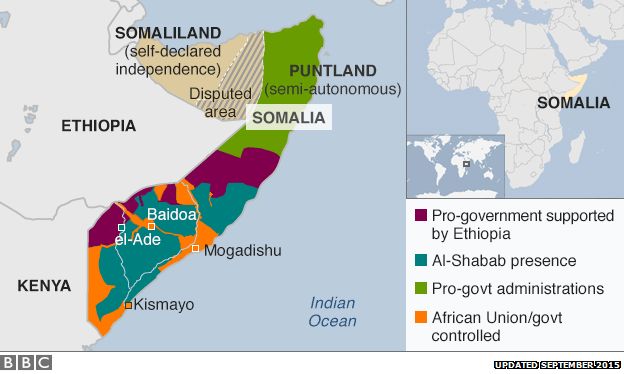
Source: bbc.com
- Read more
-
15/Jan/2016
Cologne attacks: Migrant men banned from German swimming pool
A German town has banned male asylum seekers from a public swimming pool after women complained of harassment.
A government official in Bornheim said men from a nearby asylum shelter would be barred until they "got the message" that such behaviour was not acceptable.
It follows outrage over hundreds of sexual assaults in nearby Cologne and other German cities on New Year's Eve.
Those attacks, by men of mainly Arab and North African origin, raised tensions over the influx of migrants.
More than 1.1 million people claimed asylum in Germany in 2015.
The head of the social affairs department in Bornheim - about 20km (12 miles) south of Cologne - said the move to ban migrant men followed increasing number of reports of inappropriate behaviour from female swimmers and staff members.
"There have been complaints of sexual harassment and chatting-up going on in this swimming pool... by groups of young men, and this has prompted some women to leave," Markus Schnapka told Reuters.
He said none of the complaints involved a crime being committed, but that social workers in the town would help to ensure the asylum seekers changed their behaviour.
It is unclear how this rule will be enforced, although Germany is set to introduce new ID cards for migrants in February.
Support falling
Correspondents say the pool ban is the latest sign of increased tensions following the Cologne attacks.
On Thursday, the authorities in another town in west Germany, Rheinberg, cancelled a carnival parade planned for February over security concerns.
Rheinberg's public security chief, Jonny Strey, told German media that events in Cologne had influenced the decision and that officials were worried about from men from migrant backgrounds misbehaving.
Rheinberg Mayor Frank Tatzel later denied this, according to Reuters.
Cologne authorities expressed concern about the city's own carnival in February following the NYE attacks, promising to step up security and public awareness.
An opinion poll on Friday showed public anxiety increasing over the number of refugees and migrants arriving in Germany.
In the research, published by broadcaster ZDF (in German), 66% of the 1,203 respondents said Germany could not handle the arrivals, up from 46% in December.
Support for Chancellor Angela Merkel, under pressure over her policies to welcome refugees, also fell - with 39% of people agreeing the chancellor was doing a "good job" in this area, down from 47% in December.
Source: bbc.com
- Read more
-
15/Jan/2016
About Us
-
Archives
Recent posts
News for people who want to know
- Bakus Radio resource for |Ghana & Africa music |News |Entertainment |Sports | Copyright © 2016 . All Rights Reserved.
- Designed By Fresco Software Solution Pvt. Ltd.



























